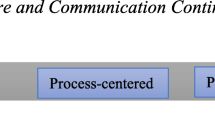Abstract
Objective
Family practitioners are significant providers of mental health care and routinely report difficulty acquiring timely support in this area. The Collaborative Mental Health Care Network assembled groups of family practitioners and provided them with mental health practitioner mentors. This article addresses communication in the Network, its effect on family practitioners, and the role e-mail plays.
Methods
This descriptive study utilizes two sources of data: a quality assurance survey administered to family practitioners in the Network and a sampling of e-mail correspondence between family practitioners and mental health and addiction mentors, examined qualitatively.
Results
Family practitioners in the Network requested consultation on pharmacotherapy (53%), psychotherapy (34%), treatment review (27%), and diagnosis (24%). Satisfaction with the Network was high, with 88% of family practitioners reporting an improvement in ability to provide mental health care. E-mail analysis suggests that mentors convey information directly and indirectly and that a knowledge hierarchy, but not a power hierarchy develops. The trusted relationship between the mentee and mentor is an important context for effective education.
Conclusion
This model of mentoring is highly satisfactory to family practitioners and correlates with increased confidence in caring for patients with mental health issues. E-mail is a promising strategy for effective feedback and support between family practitioners and specialists.
Similar content being viewed by others
References
Lesage AD, Goering P, Lin E: Family physicians and the mental health system: report from the mental health supplement to the Ontario health survey. Can Fam Physician 1997; 43: 251–256
Government of Alberta: Alberta’s Health System, Some Performance Indicators. November 2002. Available at www.health.gov.ab.ca
Tattersall MH, Griffin A, Dunn SM, et al: Writing to referring doctors after a new patient consultation: what is wanted and what was contained in letters from one medical oncologist? Aust NZ J Med 1995; 25: 479–482
Ely JW, Osheroff JA, Ebell MH, et al: Analysis of questions asked by family doctors regarding patient care. BMJ 1999; 319: 358–361
Connelly DP, Rich EC, Curley SP, et al: Knowledge resource preferences of family physicians. J Fam Pract 1990; 30: 353–359
Newton J, Eccles M, Hutchinson A: Communication between general practitioners and consultants: what should their letters contain? BMJ 1992; 304: 821–824
Kashner TM, Rost K, Smith GR, et al: An analysis of panel data: the impact of a psychiatric consultation letter on the expenditures and outcomes of care for patients with somatization disorder. Med Care 1992; 30: 811–821
Kates N, Lesser A, Dawson D, et al: Psychiatry and family medicine: the McMaster approach. Can J Psychiatry 1987; 32: 170–174
Davies JW, Ward WK, Groom GL, et al: The case-conferencing project: a first step towards shared care between general practitioners and a mental health service. Aust N Z J Psychiatry 1997; 31: 751–755
Horner D, Asher K: General practitioners and mental health staff sharing patient care: working model. Australas Psychiatry 2005; 13: 176–180
Gask L: Overt and covert barriers to the integration of primary and specialist mental health care. Soc Sci Med 2005; 61: 1785–1794
Coupland N, Jaworski A: Discourse, in The Routledge Companion to Semiotics and Linguistics. Edited by Cobley P. London; New York, Routledge, 2001, pp 134–148
Mills S: Discourse analysis, critical linguistics, and social psychology, in Discourse. London and New York, Routledge, 1997, pp 131–158
Government of Ontario, Canada: About Ontario. Available at http://www.gov.on.ca
Rockman P, Salach L, Gotlib D, et al: Shared mental healthcare: a model for supporting and mentoring familyphysicians. Can Fam Physician 2004; 50: 397–402
Hodges B, Inch C, Silver I: Improving the psychiatric knowledge, skills and attitudes of primary care physicians, 1950–2000: A Rev Am J Psychiatry 2001; 158: 1579–1586
Rose G, Rukstalis M, Schuckit M: Informal mentoring between faculty and medical students. Acad Med 2005; 80: 344–348
Connor MP, Boyne AG, Redfern N, et al: Developing senior doctors as mentors: a form of continuing professional development. Report of an initiative to develop a network of senior doctors as mentors: 1994–1999. Med Educ 2000; 34: 747–753
Leslie K, Lingard L, Whyte S: Junior faculty experiences with informal mentoring. Med Teach 2005; 27: 693–698
Marshall J, Stewart M, Ostbye T: Small-group CME using email discussions: can it work? Can Fam Physician 2001; 47: 557–563
Gains J: Electronic mail—a new style of communication or just a new medium? An investigation into the text features of e-mail. English for Specific Purposes 1999; 18: 81–101
Chan DH, Leclair K, Kaczoraowski J: Problem-based small group learning via the internet among community family physicians: a randomized controlled trial. MD Computer 1999; 16: 54–58
Craven M, Bland R: Better practices in collaborative mental health care: an analysis of the evidence base. Can J Psych 2006; 51(6 suppl 1): 7S–72S
Author information
Authors and Affiliations
Corresponding author
Additional information
Grant support for this study occurred via the Ontario Ministry of Health and Long Term Care, which provides funding for the Collaborative Mental Health Care Network.
Rights and permissions
About this article
Cite this article
Hunter, J.J., Rockman, P., Gingrich, N. et al. A Novel Network for Mentoring Family Physicians on Mental Health Issues Using E-mail. Acad Psychiatry 32, 510–514 (2008). https://doi.org/10.1176/appi.ap.32.6.510
Received:
Revised:
Accepted:
Published:
Issue Date:
DOI: https://doi.org/10.1176/appi.ap.32.6.510




